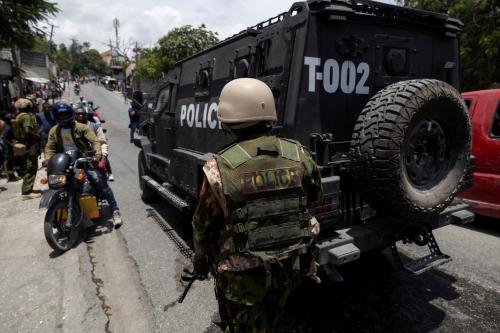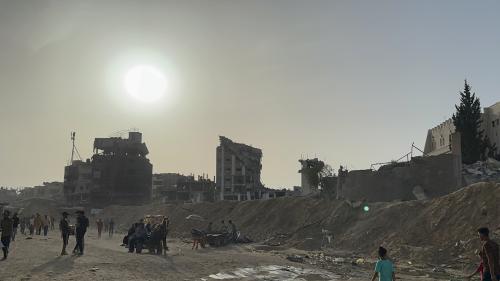

10:00 am EST - 11:00 am EST
Past Event
With seven deployments on the African continent, U.N. Peacekeeping Operations (UNPKO) play a critical role in fostering conditions for sustainable peace after conflict. Of the 57 completed missions across Africa since 1960, many have delivered lasting results, while others have struggled to achieve their objectives, and are criticized for poor planning and mismanagement. Still, various studies suggest a success rate in the range of 60 percent of all cases.
On February 11, Foreign Policy at Brookings hosted a panel featuring Lise Howard of Georgetown University and Grace Kpohazounde of the United Nations to discuss policy issues related to UNPKO, contemporary successes and challenges, and lessons for the future. Brookings Senior Fellow Michael O’Hanlon moderated the conversation.
In her opening remarks, Howard summarized key findings from recent quantitative studies on the role of UNPKOs. Fist, she explained that peacekeepers correlate with fewer civilian casualties, while more peacekeepers — and more diverse peacekeepers — correlate with both fewer civilian deaths and fewer military deaths.
Second, she noted that recent studies have found that more U.N. peacekeepers lead to less sexual- and gender-based violence during conflict, even as more U.N. peacekeepers leads to greater instances of transactional sex, though the presence of more women in peacekeeping leads also to less sexual exploitation and abuse.
Third, while research has found that peacekeepers also prevent the spread of violence and help keep the peace once violence has ended, they also produce better post-conflict institutions and increase civil society activity.
Finally, Howard’s research found that since the end of the Cold War, U.N. peacekeepers have a two-thirds success rate in completing complex mandates and exiting (11 of 16 completed missions). These 11 are:
Currently, there are 12 U.N. peacekeeping missions. Four of the 5 most complex missions are in Africa (Malia, the Democratic Republic of Congo, the Central African Republic, and South Sudan). Howard stressed that it’s primarily Africans who volunteer their troops for UN peacekeeping missions.
Kpohazounde, a native of Benin who is currently based in Ivory Coast, where a peacekeeping operation has recently closed, said her experience aligns with Howard’s research, saying: “Peacekeeping has been effective overall. When you look at Africa, from the 1960s to today, we have had periods where we had about 25 peacekeeping operations deployed over the continent. Today we have about seven. So, it means that there has been stability on the ground, and I like to think that somehow peacekeeping operations have contributed to the stability.”
O’Hanlon, who began his career as a Peace Corps volunteer in then-Zaire, noted that the record of peacekeeping is quite strong when considering it costs the world only about $7 or $8 billion annually, or about 1% of the U.S. defense budget. So, while he acknowledged that there is work to be done to address shortcomings, O’Hanlon concluded that peacekeeping is “an area of international security policy that shows considerable success, achievement, and promise.”
He closed the conversation by stressing that even as analysts and policymakers acknowledge the mistakes of peacekeeping, it’s also important to acknowledge things can be far worse, as they were in then-Zaire in the 1980s, where the history of horrible colonial rule, fractious politics, and Mobutu Sese Seko’s strong-arm autocracy prevented the formation of institutions to effectively govern such a large country. Kpohazounde was also supportive of the ongoing peacekeeping mission in the DRC.
Panelist


Landry Signé
May 27, 2025

Sophie Rutenbar
July 12, 2024

Sharan Grewal, Shady ElGhazaly Harb
May 22, 2024